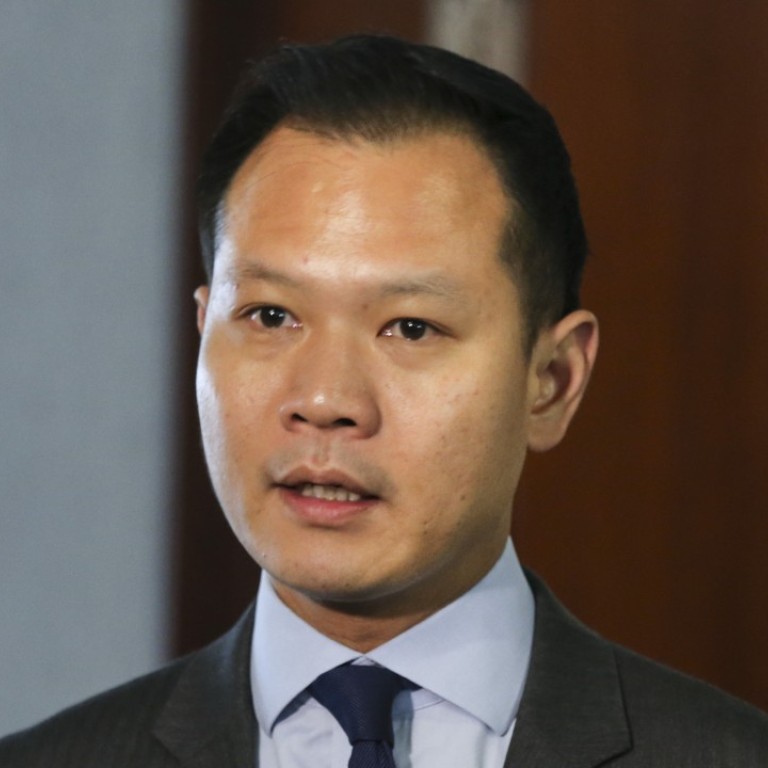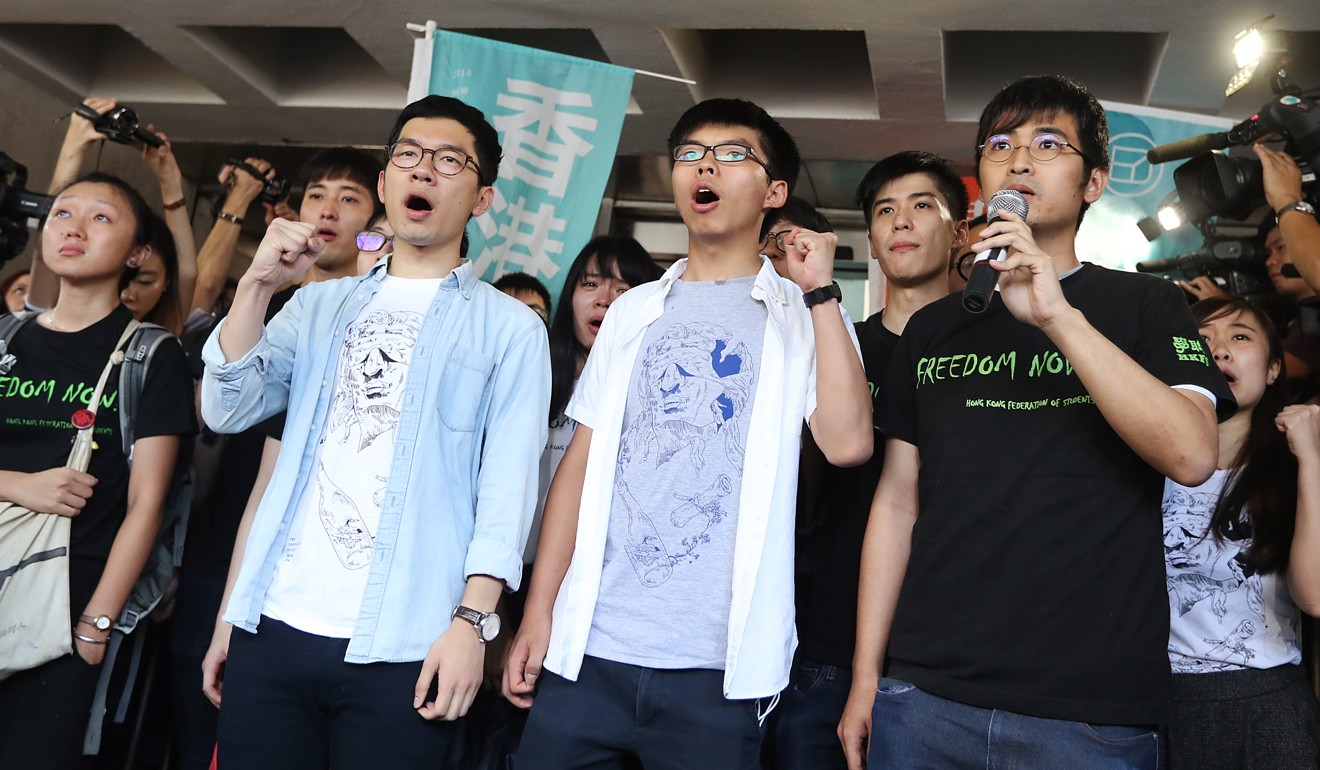
Lawmaker calls for greater independence for Hong Kong’s chief prosecutor
Dennis Kwok wants to push for a more independent prosecutorial model that will see the current director of public prosecutions subject to less interference from the secretary for justice
A Hong Kong legal sector legislator has pledged to push for greater independence for the city’s chief prosecutor from his or her politically-appointed superior, the justice minister, in the wake of the recent controversial jailing of three pro-democracy student activists.
Lawmaker Dennis Kwok told the Post that he intended to raise the issue at the Legislative Council’s administration of justice and legal services panel when the city’s lawmaking body resumed after this summer.
His intended move followed a Reuters news report which suggested that Secretary for Justice Rimsky Yuen Kwok-keung, a politically-appointed official, might have overruled his top prosecutors to press for harsher sentences for three Occupy student leaders – despite the three being originally spared jail. Joshua Wong Chi-fung was jailed for six months, Nathan Law Kwun-chung for eight and Alex Chow Yong-kang for seven, last month.
Despite Legco ouster, Hong Kong politician ‘Long Hair’ Leung keeps faith in city’s social activism
Kwok’s call for a more independent director of public prosecutions was also echoed by a former legislator who chaired the same legal panel and former chief prosecutor, who described the current “optics” as being “bad”.

Kwok said he aimed to push for a more independent prosecutorial model that will see the current director of public prosecutions subject to less interference from the secretary for justice – the equivalent of an attorney general in other common law countries.
On the other hand, the justice minister is also accountable for criminal matters, which may inevitably affect government’s strongest critics who have been increasingly keen to take up the mantra of civil disobedience.
Former student leader and ousted lawmaker Nathan Law lodges final appeal against jail sentence
According to a document the justice department submitted to Legco in 2011, in practice, the director of public prosecutions and other counsel consulted make the vast majority of prosecution decisions, but the secretary for justice would come in when cases are brought to his or her attention.
Kwok said the current problem lied in the political nature of the justice secretary, who is hand-picked by the government primarily to handle its legal affairs in accordance with the administration’s will, he said.
That makes the recent jailing of the three students a case in point, he said.
The three were convicted of either unlawful assembly or inciting others to do so when protesters stormed the forecourt of the government office on September 26, two days before the start of the Occupy protests.
They were originally ordered to perform community service or observe a suspended sentence by a lower court. But they were eventually put behind bars after lawyers from the Department of Justice took the trio back to an appeal court demanding a jail sentence.
Kwok noted that three students were the poster boys for the 2014 Occupy protests, the unprecedented pro-democracy sit-in set off by dissatisfaction against the restrictive framework Beijing imposed on Hong Kong, which Yuen was involved in promoting.
“He should have recused himself,” Kwok said, referring to Yuen’s possible involvement in the request to jail the trio.
It is not the first time pressure has fallen on the justice department: there was controversy in 1998 when then Secretary for Justice Elsie Leung Oi-sie made a decision not to prosecute newspaper tycoon Sally Aw Sian. Since then, a panel discussion had taken place in 2011 to debate what the secretary’s role should be, especially when protesters have become more prone to being prosecuted for offences like obstruction.
Fund aims to raise HK$4 million for Joshua Wong and his fellow activists jailed in Hong Kong
Former director of public prosecutions Grenville Cross said he did not think Yuen would have to come out to explain his role concerning the students’ cases because this information was privileged. He also said the present case, which centred on a sentence review, was within the secretary’s power according to a statutory provision passed by the lawmakers.
However, he said there is a need for greater prosecutorial independence.
“Although I believe that the secretary for justice, given his undoubted integrity, does in fact act independently when he discharges his prosecutorial function,” he said. But people would still find it hard to accept the secretary would have acted independently when he put on “the prosecutor’s hat”, he added.
“I have to admit that the optics are bad,” he said.
The retired prosecutor chief said Hong Kong should look to Britain for reference over a protocol issued in 2009, in which the attorney general there would no longer be hands-on – or even be informed of a case – unless there were of exceptional nature, for example, on a matter of national security.
Former legislator Margaret Ng Ngoi-yee, who chaired the Legco panel when the issue was discussed in 2011, said: “People don’t have confidence in Rimsky Yuen.”
She believed a more independent head prosecutor would help ease public concerns, but cautioned that it still came down to the justice secretary on whether he or she would respect a new model, if any, and his director of public prosecutions.
A spokesman from the Department of Justice insisted it had been bringing prosecutions independently, but it said the secretary for justice remained the one accountable for prosecutions as this is a requirement under the Basic Law, the city’s mini-constitution. The secretary’s power is also recognised by the legislature in certain provisions of the law, as well as a court judgment.
He said the secretary would delegate his power when potential conflict of interests or officials are involved. Legal advice from outside counsel would also be sought, he said.
“[But] that said and given our commitment to steadfastly uphold the rule of law, the Department of Justice will not shut our minds to constructive suggestions as to how the current regime can be further improved,” the department spokesman said.

